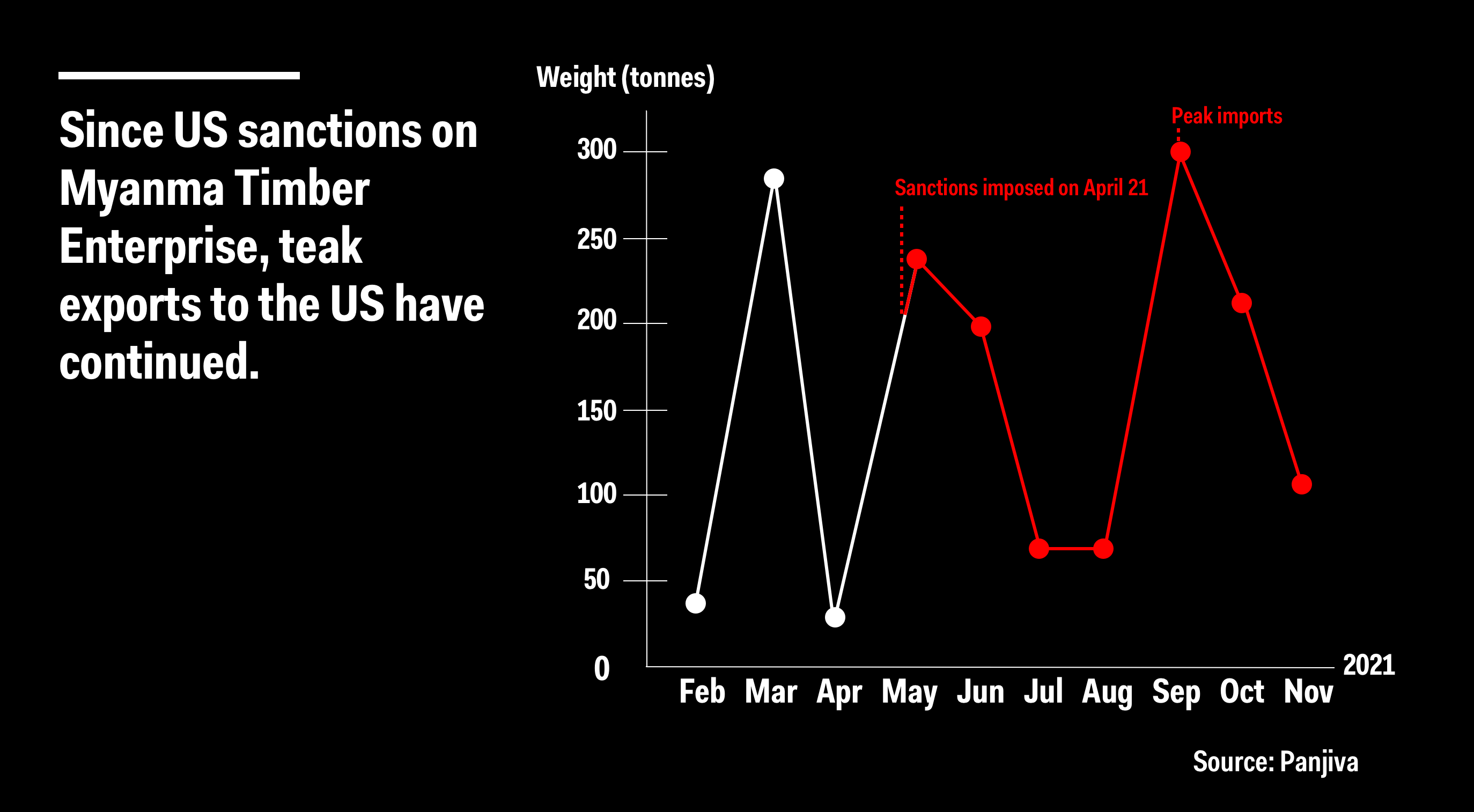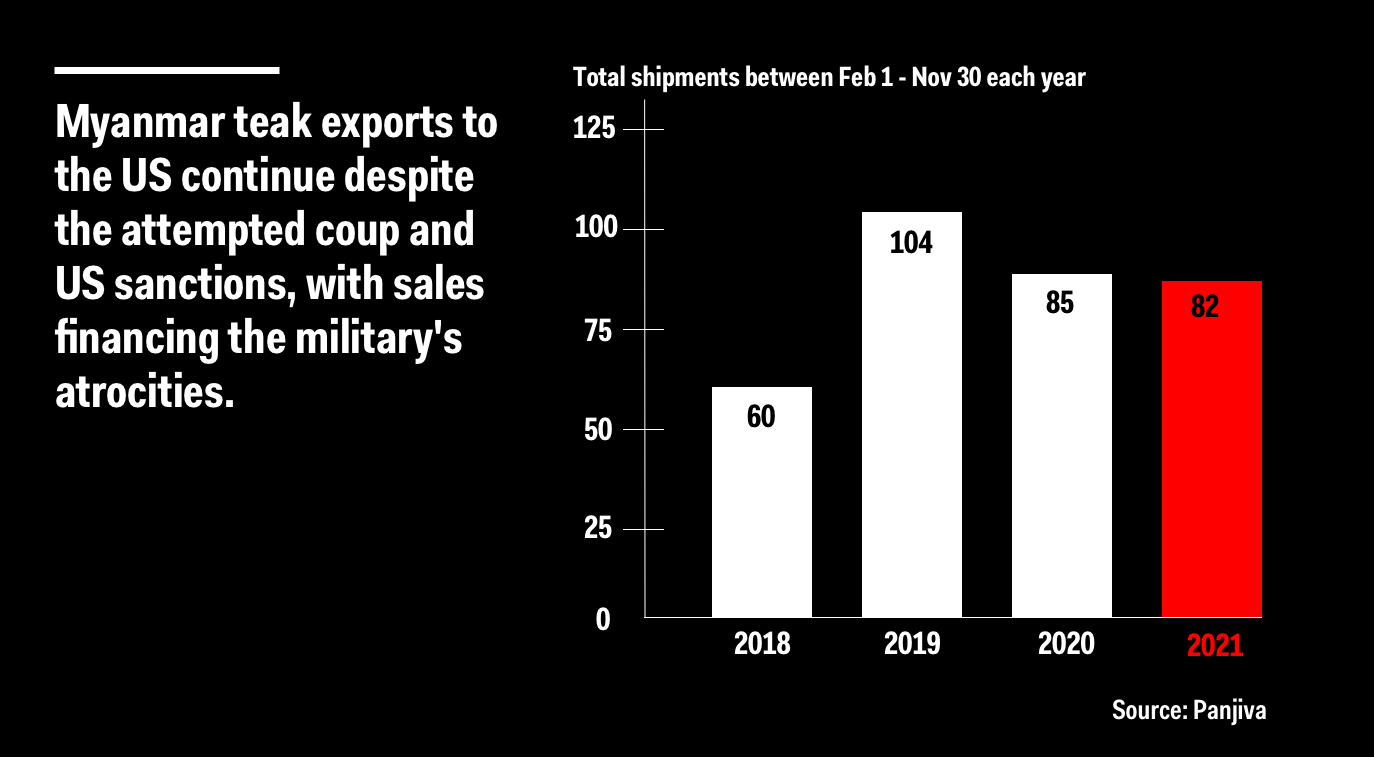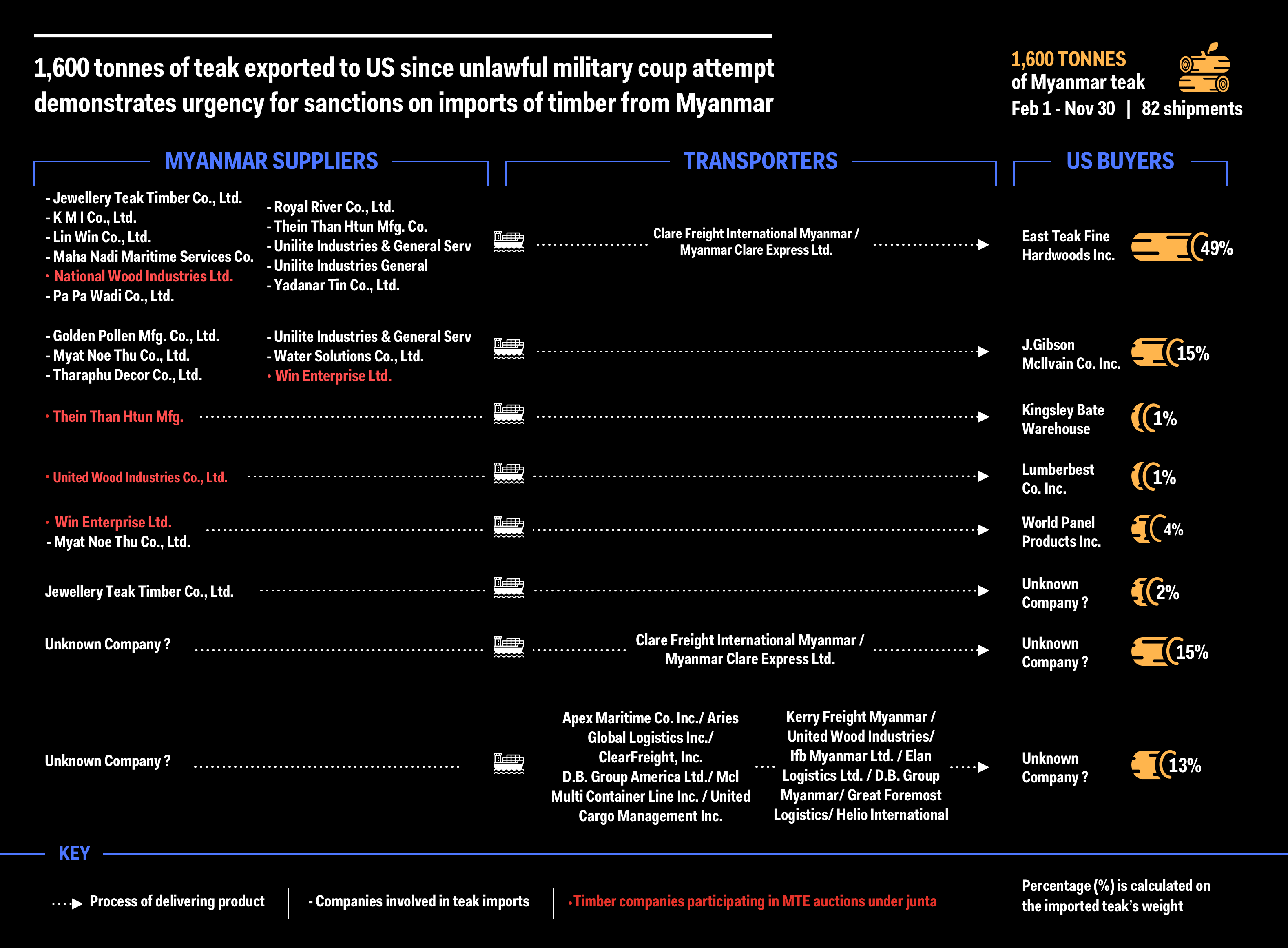
US companies imported nearly 1,600 tonnes of Myanmar teak, circumventing sanctions
January 11, 2022
As trade in Myanmar teak continues amidst sanctions, a ban on all Myanmar timber imports is necessary.
Since the illegal attempted military coup in February 2021, the United States has imported 1,565 metric tonnes of teak from Myanmar, even though sanctions began soon after.
Following the attempted coup, the Myanmar military has carried out acts of terrorism against Myanmar people, murdering over 1,400 civilians and imprisoning 11,000 more, indiscriminately bombing and shelling communities and committing mass killings with total impunity.
In response, the United States has imposed multiple targeted sanctions, including on the state-owned Myanma Timber Enterprise (MTE).
MTE has sole responsibility for the sale of timber in Myanmar, auctioning logs for export. The forestry industry in Myanmar is effectively controlled by MTE.
According to MTE’s website, its Export Marketing and Milling Department has competencies that “cover the timber supply chain from the moment of truck, barge and train load arrive at timber depots until the transfer of the ownership of the cargoes to the customer at ports and terminals”. MTE operates teak sawmills that produce scantling for export and the enterprise regulates the private sector trade.
Since the military’s attempted coup, MTE has come under the control of the Myanmar military junta. Through MTE, the junta takes a percentage of export revenue, and this helps finance their atrocities.
The US Department of the Treasury’s Office of Foreign Assets Control (OFAC) imposed sanctions on MTE, with the justification that the timber industry is a key economic resource for the Myanmar military junta.
Yet, from February to the end of November, US businesses continued to import teak from Myanmar, according to data from the global trade database, Panjiva.

The 82 shipments largely consisted of teak board and scantling that are used for shipbuilding, outdoor decking, and furniture.
The first shipment of teak after the attempted coup arrived on February 18 and the most recent shipment arrived in December.
In fact, there was a sharp increase in teak exports to the US a few months after the sanctions were imposed, which may coincide with the timing of teak auctions held by the MTE.
When looking at the total number of shipments from February to November 2021 compared with the same time period in previous years, it is evident that the flow of teak from Myanmar to the United States has been quite consistent.

But how are these exports possible when the US has sanctions in place?
See a list of businesses and individuals involved in the Myanmar teak trade with the US: Download Excel File (25 kb)
Evading weak sanctions by trading via intermediaries
The answer is that importers in the US are purchasing timber from private companies that are acting as brokers in Myanmar; they are evading sanctions by not buying directly from MTE.
These private companies include major teak traders, some of which have reportedly placed winning bids at MTE auctions since the attempted coup.
The private companies that act as brokers buy the timber from MTE in Myanmar, then export it, sometimes through foreign freight companies.
While the data analysed for this feature only captured teak exports directly from Myanmar to the United States, it is likely that even more teak is being exported to the US via third countries such as China. So, the overall amount of teak exported since the attempted coup is expected to be significantly more.
This indirect trade between companies in the US and MTE may not have attracted penalties from OFAC at this stage, but it still appears to contravene US sanctions.
Sanctions imposed by the United States on MTE prohibit “the making of any contribution or provision of funds, goods, or services by, to, or for the benefit of any blocked person”.
Considering that timber exported from Myanmar is originally auctioned by MTE, the military junta still receives funds from the various charges applied, no matter who officially exports the timber.
A report from Myanmar’s Extractive Industries Transparency Initiative shows that the state received almost USD$100 million in revenue from taxes and royalties applied to timber trade in the 2017-2018 financial year, the last year for which data is available.
The country’s total revenue from the forestry industry that year was USD$322 million, so the taxes and royalties now flowing to the military junta from the post-attempted coup timber trade are significant.
Considering the scope of the problem and potential for the illegal military junta to gain vast sums of money to fund their atrocity crimes, it is clear that further action is essential.
Lack of transparency makes trade after sanctions difficult to trace
Before the coup attempt, MTE used to announce details of its upcoming timber auctions in advance and disclose some of the auction outcomes.
The last auction in which winning bidders were disclosed was held on January 28, 2021. As full payments were due within 75 days, the funds were likely received by the illegal military junta.
After the attempted coup, MTE's official disclosure of successful auction bidders is no longer publicly available on its website. It is likely that only businesses and timber companies close to the military junta will have access to this information, which is concerning because this information is critical to taking action against companies circumventing sanctions.
Yet, according to information published in state-run newspapers controlled by the military and other media reports, at least nine open timber auctions have been held since the coup that included teak.
The Lacey Act must be enforced
Since 2008, amendments to the Lacey Act in the United States have prohibited the importation of illegally sourced timber.
It requires companies to take due care to ensure that timber they purchase – including from overseas sources – has been harvested legally and to declare its country of origin.
While this law addresses illegal logging – and does not include purchasing from an illegal military junta in its scope – it does require some transparency about the timber supply chain.
It’s very difficult to get information about how timber is harvested in Myanmar, however, when a company exercises due care in tracing the origin of its timber, it should easily uncover MTE in the supply chain.
In Myanmar, all legally harvested timber for export passes through MTE. So, compliance with the Lacey Act should – even inadvertently – lead companies to MTE.
And this should lead to the conclusion that timber should not be lawfully imported to the United States due to the current sanctions against MTE.
But despite the efforts of organisations such as Environmental Investigation Agency, the Act is still not strongly enforced on timber imports from Myanmar.
Effective enforcement of the Lacey Act could potentially lead more companies to think twice before importing timber from Myanmar.
International banks also implicated
According to the MTE website, all of its sales are made in USD dollars and payments can be made via several banks.
These include Singaporean banks United Overseas Bank (UOB), Oversea-Chinese Banking Corporation (OCBC) and DBS Bank.
These banks are playing an enabling role for the military junta and international action is needed. They may also be breaching US sanctions by accepting US dollar transactions in which MTE is the beneficiary.
How US industries are responding to the timber sanctions
Timber sellers, shipbuilders, furniture makers and others who produce teak products in the United States are responding in various ways to the sanctions.
While some are using indirect pathways to continue importing, others are seeking alternative products.
Shipbuilders in particular have long used Myanmar teak for its high silicone and resin content that makes it more durable in wet environments.
But given the situation in Myanmar, some recognise the imminent need to shift to other materials, and are trialling products such as iroko, other timbers and even synthetic teak.
Meanwhile, one small company called Techtona, a social enterprise that exported recycled teak from old buildings in Myanmar to the US, has closed down.
The business was hit hard by the COVID19 pandemic and a representative told Justice For Myanmar that trading any timber in Myanmar now risks supporting the military junta: “We cannot any longer import anything from Burma to USA because everything that gets exported has to pay some permit fee – and that could go to the wrong people. So this kind of business – and actually all business in Burma – is now impossible.”
What the companies still importing Myanmar teak say
Justice For Myanmar asked the US companies that have imported since the attempted coup about their purchases and whether they intend to keep importing teak from Myanmar.
World Panel Products, a US-based timber supplier to the marine industry, responded: “Don't agree with the Coup. We ensure that whoever we purchase from directly in Myanmar are not associated with any of the Army Generals or their family.”
World Panel Products also said they had not participated in any MTE timber auctions in 2022. Yet, transactions involving the company appear in the Panjiva trade database after the coup, with post-coup exports likely enriching the military junta.
Justice For Myanmar wrote to teak importers J. Gibson McIlvain, East Teak, Lumberbest, Kingsley Bate, but we have not received a response.
We also wrote to logistics companies Clare Express, DB, Apex Shipping (a subsidiary of Kerry Logistics) and UCM Cargo, which have transported Myanmar teak trade to the US since the attempted coup, asking about their human rights due diligence and US sanctions. None of the companies responded.
Europe also still importing Myanmar teak post-coup
The European Union also sanctioned MTE in June 2021. Yet, European companies have continued importing teak.
A report by the Environmental Investigation Agency found that Italy alone has imported teak worth over €2 million from Myanmar since the attempted coup.
The problem with teak trade to Europe is similar to the United States: companies have been able to circumvent sanctions. In Europe this has involved trading via Italy and other countries where sanctions are not well enforced.
Companies in Europe are also required to conduct due diligence in timber trade under the European Union Timber Regulation, which prohibits the sale of illegally harvested timber in Europe.
This due diligence effort for any trade in teak from Myanmar would uncover MTE in the supply chain, and therefore a company should not proceed with such imports.
The Environmental Investigation Agency is calling for the companies violating EU sanctions through trade in illegal teak from Myanmar to be investigated and prosecuted. Justice For Myanmar echoes that call.
Ban Myanmar timber imports!
The evidence shows that the sanctions have not stopped the flow of teak to the US, and therefore have not stopped the flow of funds from the timber trade to the illegal military junta.
The need for international action to stop the Myanmar military's international crimes is becoming increasingly urgent. After the Myanmar military's killing of at least 35 people on Christmas Eve in Karenni State, the UN Security Council issued a statement demanding an immediate cessation of violence and accountability, yet the junta's campaign of terror continues with total impunity.
The companies who are aiding the Myanmar military and trading with the entities it controls, are complicit in the crimes committed by the Myanmar military.
If the US and other international governments are serious about their roles in stopping the military junta's campaign of terror and supporting the people of Myanmar, further action is urgently needed.
Justice For Myanmar calls on the United States and other international governments to:
- urgently investigate the teak and timber trade with Myanmar. The OFAC should investigate whether any of these transactions have violated the current sanctions against MTE. If these imports were lawful, then it shows that current sanctions have not effectively stopped the trade in Myanmar teak to the US, therefore further measures are needed.
- promptly investigate all banks and financial institutions processing teak payments.
- ensure that current sanctions involving trade with Myanmar are vigorously enforced.
- ensure that the Lacey Act is enforced with regard to timber imports from Myanmar.
- impose new targeted sanctions on all companies and individual directors involved in exports of products from industries controlled by the military junta, including timber.
- impose new targeted sanctions on all other military-related businesses and associations.
- ban all Myanmar timber imports to prevent further revenue from reaching the illegal military junta.
Companies still trading Myanmar teak amidst US sanctions
In the section below, we provide details of the companies involved in the teak trade from Myanmar to the United States since the attempted coup in February 2021.

Largest US importer: East Teak Fine Hardwoods
Up to 49 per cent of the imports since the coup were made by the largest importer of Myanmar teak in the United States: East Teak Fine Hardwoods (ETFH). This company alone has bought over 765 tonnes of teak boards and scantling which arrived in 44 shipments.
The Myanmar timber companies that exported these shipments include: Thein Than Htun Manufacturing Company Limited, National Wood Industry Ltd, Maha Nadi Maritime Services Company, Unilite Industries & General Serve, Jewellery Teak Timber Company, Pa Pa Wadi Company, Yadanar Tin Company, Lin Win Company, Royal River Trading Company and KMI Company.
Among the local companies that exported to ETFH, Thein Than Htun Manufacturing Company Limited is the largest supplier. Since the attempted coup, the company has been confirmed as placing winning bids on teak at MTE auctions and has sent 22 shipments to the United States.
Questionable ties within the industry
The Thein Than Htun Manufacturing Company Limited has also sold teak to Kingsley Bate Warehouse, a leading US manufacturer of teak outdoor furniture.
Thein Than Htun’s director, Kyaw Kyaw, is also the director and shareholder of United Wood Industries Company, another company that placed winning bids on teak at MTE auctions.
Since the coup, United Wood Industries Company has shipped teak via the logistics company Apex Maritime and to the wholesaler Lumberbest, which specialises in selling “genuine Myanmar natural teak.”
One of United Wood’s directors and shareholders is Bjorn Burchard, a Norwegian citizen with longstanding ties to MTE. Under the previous military junta, Bjorn was managing director of Scantrade, a business that jointly operated a furniture factory with MTE and was sanctioned by the European Union. Norwegian authorities should investigate and prosecute Bjorn Burchard for his role in the teak trade.
Similarly, multiple companies involved in the post-attempted coup teak trade have close and questionable ties to the MTE and the export-promoting industry association, the Myanmar Timber Merchants Association (MTMA).
The MTMA plays a key role in facilitating trade relationships among the Myanmar timber industry, foreign buyers and the MTE. It operates under the guidance of UMFCCI (a federation of the country’s chambers of commerce and industry), which is closely linked to the military junta.
For example, KMI Company and National Wood Industry Limited are companies that have also exported teak to the United States since the coup attempt. These companies have two directors in common: Kyaw Win and Ye Htet Win. Kyaw Win is also the Honorary Auditor of the MTMA and Ye Htet Win is a member of the Central Executive Committee of the MTMA.
KMI Company’s other director, Min Thaw Kong, is also a director of Win Enterprise Limited, another timber company that exported teak to the United States since the attempted coup. Win Enterprise Limited is a subsidiary of Forest Products Joint Venture Corporation. Min Thaw Kong is a Secretary General (2) of MTMA and also a director of Forest Products Joint Venture Corporation. Forest Products Joint Venture Corporation is a joint venture between MTE, Myanmar’s Forest Department and private enterprises, which processes teak and has been sanctioned by the European Union.
Other large US importers
The second and third largest US teak importers since the coup attempt are J. Gibson McIlvain Company, a timber wholesaler well-known in the shipbuilding industry, and World Panel Products, the leading marine panel distributor in the United States.
Both of these companies bought teak from Win Enterprise Ltd and Myat Noe Thu Company. J. Gibson McIlvain Company also bought teak from Golden Pollen Manufacturing Company, Water Solutions Company, Tharaphu Decor Company, and World Panel Products also bought from KMI Company. Notably, Water Solutions Company and Tharaphu Decor Company have a common director, Min Min Shein.
Freight companies exporting Myanmar timber to US amid sanctions
Multiple freight companies operating in the United States and Myanmar are also implicated in the teak trade.
Largest transporter to US: Clare Group
Among these, the Clare Group alone has transported almost 1,000 tonnes in 54 shipments, which is equal to 64 per cent of the total teak imports after the coup.
The Clare Group is a multinational logistics company with subsidiaries in multiple countries, headquartered in Taiwan.
Other large transporters
Another freight company involved in these shipments is the Italian D.B. Group, an international transport and logistics company. Its Myanmar subsidiary, D.B Group Myanmar Company, has shipped teak to D.B. Group’s US-based subsidiary, D.B. Group America.
Great Foremost Logistics Company Ltd and the British Virgin Islands' logistics and supply chain management company IFB Myanmar Ltd, part of IFB Group, have also transported Myanmar teak to the US since the attempted coup. IFB Myanmar is run by two German citizens.
The involvement of these Italian and German linked companies in teak exports could violate the European Union's sanctions against MTE. This is because the EU sanctions apply to all companies that have a presence in an EU Member State, even when they are operating elsewhere.
Kerry Logistics, a Hong Kong based company engaged in logistics, freight services and warehouse operations, has additionally been involved in transporting teak to the United States through its subsidiary Kerry Freight Myanmar Ltd and its US subsidiary, Apex Maritime.
Freight companies in the United States, Aries Global Logistics Inc., Mcl Multi Container Line Inc. and United Cargo Management Inc., were listed as ‘consignees’ in teak shipments.



